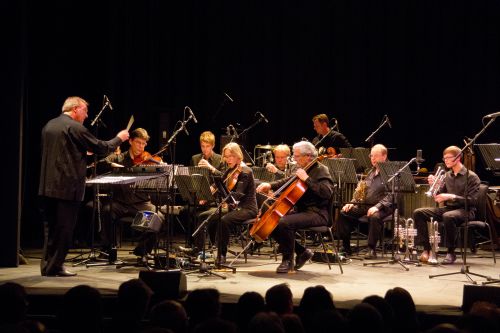 United Kingdom David Sawer, Morton Feldman/Samuel Beckett: Thomas Howes, William Oxborrow (actors), Birmingham Contemporary Music Group / Martyn Brabbins (conductor), Cheltenham Music Festival, Parabola Arts Centre, Cheltenham, 4.7.2013. (RJ)
United Kingdom David Sawer, Morton Feldman/Samuel Beckett: Thomas Howes, William Oxborrow (actors), Birmingham Contemporary Music Group / Martyn Brabbins (conductor), Cheltenham Music Festival, Parabola Arts Centre, Cheltenham, 4.7.2013. (RJ)
David Sawer – The Lighthouse Keepers
Morton Feldman/Samuel Beckett – Words and Music

Crowds cheered Martyn Brabbins a while ago when he ran a half marathon to raise funds for new music commissions. They cheered him again when he conducted Birmingham Contemporary Music Group in the première of David Sawers’ The Lighthouse Keepers, one of these commissions, at Cheltenham Music Festival.
The work is based on the play Gardiens de phare written by Paul Autier and Paul Cloquemin for the Théâtre du Grand Guignol in Paris which was made into a film in 1929. Sawer’s version, adapted by David Harrower from the French, is shorter and more concentrated, lasting less than half an hour. It depicts the plight of a father and son as they start their month-long shift on the Maudit lighthouse which stands on an isolated rock off Brittany. The son is dreading the ordeal and would much rather be with his fiancée, Marie on terra firma than with his dad, not least because he is terrified of the sea which has already claimed the life of his brother. Right from the beginning the music creates an atmosphere of menace with nervous violins hinting at the approach of a storm.
Things get worse as the night draws on and the lad grows increasingly depressed and feverish. It slowly transpires that he is not suffering from a mental condition but a medical one: he has been bitten by a mad dog and contracted rabies – and there is no help at hand. As the storm outside mirrors the tension within the lighthouse – with effective use of percussion and dissonant woodwind – a ship’s siren is heard and the sorrowful father has to leave his dying son in order to light the lamp which will ensure others do not perish.
This is the latest in a number of dramatic works by David Sawer who began in 1991 with The Panic, a chamber opera. In 2009 his ballet Rumpelstiltskinreceived its première, commissioned – like tonight’s work – by Birmingham Contemporary Music Group (who received funding for tonight not only from the Martyn Brabbins Music Fund but also from members of their own Sound Investment Scheme). It is a superbly atmospheric piece with sympathetic portrayals of father and son by William Oxborrow and Thomas Howes. The 11-strong ensemble under Martyn Brabbins’ fine direction demonstrated that you don’t need a huge symphony orchestra to conjure up a storm.
The evening was entitled Two Plays for Radio. The Lighthouse Keepers was performed as a radio programme with the actors reading their parts and operating the sound effects – with no scenery and the musicians lined up behind them. For Words and Music the audience just had three large loudspeakers to gaze upon, with all the action taking place behind a black curtain – which was somewhat baffling.
Words and Music was originally broadcast in 1962 on what was then the BBC Third Programme with music by Beckett’s cousin, John Beckett, but for some reason this version was quickly withdrawn. For the new 1987 version a score was commissioned from Morton Feldman, described as a pioneer of indeterminate music, characterised by rhythms which are free and floating, pitch shadings that seem to be softly unfocused and quiet, slowly evolving music. He seemed the perfect match for Beckett’s prose.
There are three characters in the work: the doddery Croak played by William Oxborrow, Words (Joe) played by Thomas Howes and Music (Bob) played by Martyn Brabbins and BCMG. Music interrupts the speeches of Words, and Croak appears to act as an intermediary urging cooperation between the two factions, even bursting into song in a disconcertingly frail manner. Or are Joe and Bob just figments of the imagination of an elderly roué who longs for love as the Grim Reaper draws nigh?
Words and Music is open to a wealth of interpretations, as I myself discovered in conversations after the performance. However, it was hardly the recipe for a good night out at the theatre and despite the flawless performances I felt the piece had more than its share of longueurs. If I had been listening to it from the comfort of my own home, ideally with a tot of brandy within arm’s reach, it might have been a totally different – and more rewarding – experience.
Roger Jones